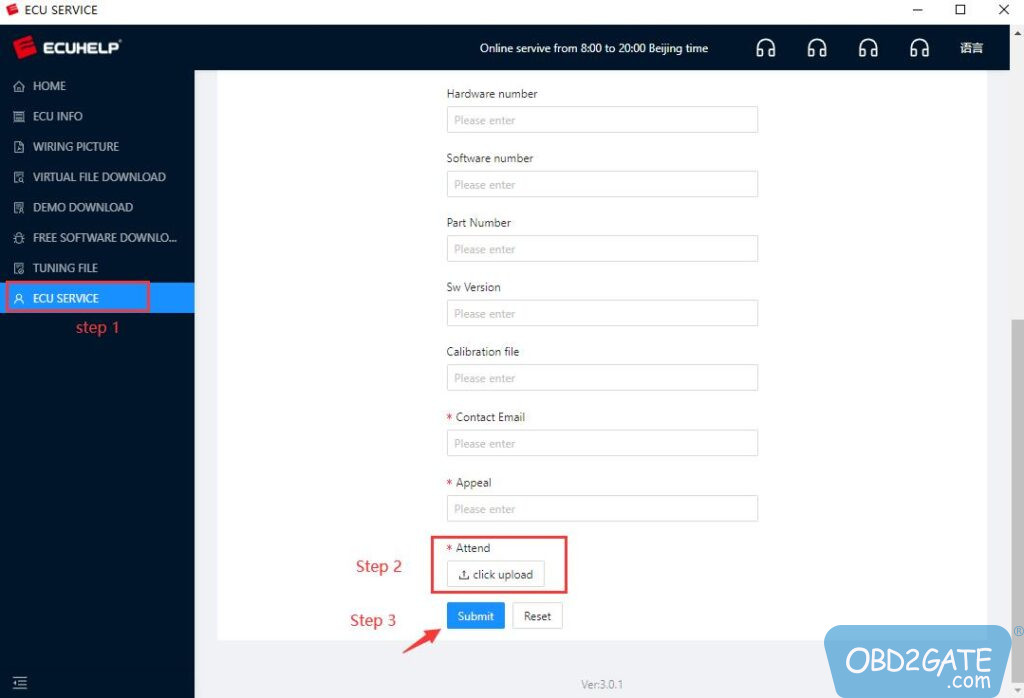Question: Is there any extra cost to tune ECU using KT200 ECU Programmer? How much time to send a file?
Answer: yes, KT200 engineer offers Stage 1 Power Upgrade service such as DPF Delete, EGR Delete, DTC Delete etc by charging, and it takes about 10-30 minutes to send a file (submit to ecuhelp 3.0 software which is downloaded here:
https://mega.nz/file/OJ1UwIoR#OKhg3My-jpNtZW_E8wFBoOhjx_Pu3QhlKdRj8_YdCnk
Click on “ECU service”, then “Upload” and then “Submit”.

Why KT200 only supply Stage 1 service, let’s read the differences among STAGE 1, 2, 3.
For some companies:
STAGE 1 tuning – Cheapest options
STAGE 2 tuning – Pay us more money and get more power
STAGE 3 tuning – Pay loads of money and we’ll build a track car! –
For others:
Typical stage 1 mods – Single bolt on parts or one time upgrade Typical
stage 2 mods – Two or more parts required Typical
stage 3 mods – Internal work required
Stage 1 Tuning Modifications
Stage 1 modifications added on their own will still work. This means that a true stage 1 modification part does not require any other engine modifications to get it to work.
Whilst other mods can help to raise the power gains and realize the full potential of the mod they are not mandatory.
These are at the bottom end of the tuning scene in terms of the overall benefits you will get. Typical stage 1 mods are generally a straightforward DIY fit and will work on a standard engine that is in good condition.
Some examples of stage 1 mods include, induction kits, panel air filters, sports exhausts, fuel pressure regulators, a simple engine remap or timing changes, blow off valves/diverters and the like.
Most of these easy to fit stage one mods are the first thing people will do on their project car. Just because they are popular it does not mean they are good mods or will add any significant power gains.
Many stage 1 mods will raise the peak power, but you might sacrifice some low end power, so effectively you are moving the power band rather than just adding power. Stage 1 tuning is a good way to set your car up for bigger gains later.
Stage 2 Tuning Modifications
These stage 2 mods offer larger power gains than stage one but will usually require additional work or other parts if you want them to work reliably.
Some of the examples listed as stage 1 can also count as stage 2 mods. So if they are extreme in their ambition and work better with other mods, regard them as a stage 2.
Stage 2 mods are usually DIY tasks but many require specialist knowledge and tools.
Typical stage 2 mods include an aggressive remap that requires a larger turbo, or higher spec turbo control valves, camshafts, and head work that alter the air flow into the engine and replacement of catalysts and filters with better flowing alternatives (if legal in your area or region). The addition of a larger or hybrid turbo and many of these other stage 2 mods will require a remap and fuelling upgrades as well as potential engine strengthening.
Fast road cams (need some engine dismantling and are fitted along with followers/lifters etc but ideally the engine will need to be remapped).
Supercharger kits (these need air intake, exhaust and mapping modifications before they can work at all.)
We recommend that most of our visitors research and look into doing stage 2 tuning, this gives the best overall effect.
Even if you think you’ll only do one or two mods, you will get the modding bug and will go on to perform many other upgrades to your car.
Stage 3 Tuning Modifications
Stage 3 modifications typically count by most people as suitable only for track days and motor sports.
Like stage 2 mods they will also need other mods to support them but tuning stages here are usually far from ideal for road use as we will explain.
Take racing brakes for example. These can tolerate extremely high temperatures but they are pretty useless whilst cool.
On the road you can’t afford to have to wait for the brakes to warm up before they operate effectively.
On the track they will run hot through each lap. An aggressive cam profile will also move the power band right up the rev range and cause a very lumpy tick over making the car hard to drive in day to day traffic.
Heavy duty clutches can be off or on in their nature and make driving in slow traffic nearly impossible.
So typical stage 3 mods would include race spec parts, that require a track environment to work properly and would render the car illegal to use on the road. Modifications such as removal of the catalysts and DPF removal, or those that cause the engine to run rich causing a smoky exhaust, or using slick tires would be included here.
A stage 3 race modified car needs regular servicing and frequent overhauls. The extra strain put on the cars engine will result in premature engine wear. If a car is used on a daily basis it will become very unreliable.
So to summarize stage 3 mods are the most aggressive and not the sort of thing you want to do on a road car.
Contact at https://www.obd2gate.com/ for ECU service
Email: Sales@OBD2gate.com
WhatsApp: +86-18123844672
Phone: +86-18123844672




















